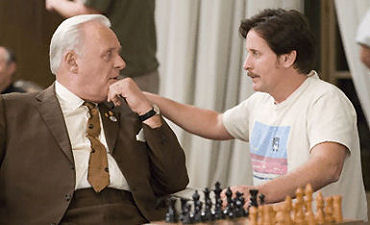The local Toronto word on Emilio Estevez‘s Bobby (Weinstein Co., 11.17) has been pretty bad for the last two or three days, and so I went into this morning’s screening pumped and ready to scoff. But the old reverse-negative effect kicked in and I wound up not hating it too much.

Bobby Anthony Hopkins, director-writer-costar Emilio Estevez .
Much of Bobby is treacly and mediocre and some of it might make you shudder, but it’s not altogether grotesque. It’s reasonaby well-shot and cut, it has a few smallish moments that work, and there are some saving grace moments near the very end.
Archival footage of the late Senator Robert F. Kennedy is basically what saves it, along with a recording of an eloquent and very moving speech that Kennedy gave about the persistent presence of violence in American life. Despite the best of intentions and the worst of consequences, Bobby fails to undermine the actual Kennedy mystique. There’s a lingering potency to the RFK legend — who he was, what he said, the metaphor of his life and how it ended.
Otherwise It’s true what people gave been saying about Bobby — it is Love Boat ’68 at the Ambassador Hotel, and that in itself makes it pretty gruesome to sit through, but if you can get past that…
Let’s try again: if you can sit back and go with the fact that Estvez is going to try and make you feel the allure of Kennedy’s Presidential primary campaign as well as the terrible shock of his murder on the night of June 4, 1968, by making you feel how it was to be an average person muddling through in ’68, and that Estevez will try for this immersion by showing you a series of Love Boat relationship stories — and I mean stories and situations that do nothing to illuminate or inform anyone about Kennedy or his ideals…if you can kick back and say, “Okay, I can roll with this…I’m ready to accept the banality of this approach,” then Bobby isn’t half bad.
I had been prepared, see, so I was ready for the worst. I first read the phrase “Love Boat ’68” in that John Ridley-authored Esquire piece that ran earlier this year. So when Bobby turned out to be tolerably pedestrian — not awful or atrocious, but mediocre in a familiar, TV-drama sort of way — it was like, “Whoa…!”
What’s especially funny in the Ridley piece is his description of the disputes over finance and script-trimming between Estevez and Bold Films owner Michel Litvak, who not only made sure that his wife, the Russian-born Svetlana Metkina, was given a part in the film but managed to arrange for her to appear in “more scenes” just as principal photography was about to begin.
Sure enough, Metkina is in the film and to be honest, she’s not half bad as a Czechoslovakian journalist looking to wangle an interview with RFK.
It isn’t the performances that are terrible — it’s the 1980s Aaron Spelling-level material. Anthony Hopkins exudes a certain courtly dignity as a longtime Ambassador Hotel employee coasting on memories. Christian Slater isn’t too bad as a racist kitchen-employee supervisor. Laurence Fishburne actually does pretty well with a couple of decently written scenes about racial politics. Elijah Wood is tolerable as a draft-dodger. Freddy Rodriguez does a decent job as the Latino bus boy who cradled Kennedy’s head as he lay on the kitchen hallway floor with a 22 calibre bullet in his brain.
Demi Moore is…well, not bad as a drunken lounge singer. William H. Macy plays a randy but fair-minded hotel manager with a certain sensitivity. Sharon Stone overacts as a hairdresser with false eyelashes and loads of mascara. Helen Hunt is a pampered wife of an older rich guy, played by Martin Sheen. Lindsay Lohan and Heather Graham give passable performances also.
Ashton Kutcher‘s hippy-dippy drug dealer gives the only really bad performance, although “silliest” or “most embarassing” is a more accurate way to put it.









